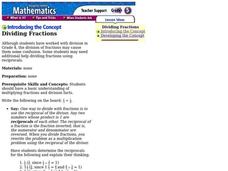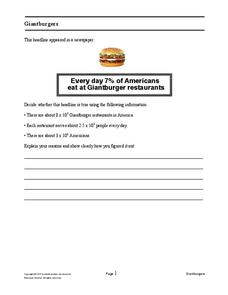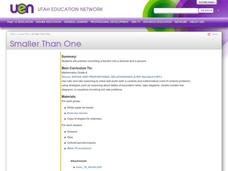Concord Consortium
Leap Years and Calendars
How many birthdays do leap year babies have in a lifetime? Learners explore the question among others in a lesson focused on different calendar systems. Given explanations of the Julian, Gregorian, and Martian calendars, individuals use...
Illustrative Mathematics
Who Has the Best Job?
Making money is important to teenagers. It is up to your apprentices to determine how much two wage earners make with their after school jobs. Participants work with a table, an equation, and a graph and compare the two workers to see...
Computer Science Unplugged
Treasure Hunt—Finite-State Automata
Introduce your class to the concept of finite-state automata with an activity that asks individuals to try to map their way to Treasure Island by taking different routes though an island chain. Each island has two ship sailing...
Illustrative Mathematics
Daisies in Vases
Have your first graders master word problems with an activity that prompts them to find as many combinations for daisies in vases, with the most in the large vase and the least in the small vase. Pupils must also explain their...
Curated OER
Dividing Fractions
Reciprocals are the method used for dividing fractions in this instructional session. A fraction is defined as being a division problem, and then the whole group works together to solve several problems. They check for the reasonableness...
Illustrative Mathematics
Average Cost
Here is an activity that presents a good example of a function modeling a relationship between two quantities. John is making DVDs of his friend's favorite shows and needs to know how much to charge his friend to cover the cost of making...
Penn Museum
Penn Museum: China Gallery
Invite your learners to take a closer look at the art and mathematical function of dome buildings as designed by the ancient Romans. In the next segment of this attractive activity set, your young historians will then learn about ancient...
Balanced Assessment
Square and Circle
To determine the dimensional change to quadruple the area, class members determine how to increase the dimensions of a square and a circle to increase the perimeter by a given factor. they then calculate the necessary factor to...
Concord Consortium
Zero Coupon Bond
There are zero reasons not to learn about zero coupon bonds. Given information about the interest rate and closing price of a zero coupon bond, future investors determine the purchase price of the bond. They then consider the...
Concord Consortium
Not So Identities
Don't compromise the identity. Given pairs of equations, scholars determine whether the equations are true for the same set of values. They explain their reasoning, considering whether it's possible to combine the equations into an...
Discovery Education
Urinalysis
What do lab tests reveal about a patient's health? Scholars perform a simulated urinalysis on two different patients by testing color, pH, glucose levels, and protein levels. Then, they compare their findings to what they know passes...
Mathematics Assessment Project
Giantburgers
Americans love burgers! Pupils determine whether a given claim about burgers is true by reasoning from the provided information. The task involves operations with scientific notation.
Curated OER
Bead It!
Fourth graders use colored beads in two problems and explore the use of proportional reasoning as a problem solving method. Working Students, in groups, explain their reasoning strategies orally, and through drawings.
Curated OER
Batting Practice: Using Math to Calculate Baseball Statistics
Students calculate and record batting average, hits, and at bats. In this Batting Practice: Using Math to Calculate Baseball Statistics lesson, students utilize mathematical formulas to determine the career statistics of baseball player...
Curated OER
A Look Back
Young scholars explore the contributions of women in the field of mathematics. In this middle or high school mathematics lesson, students use their reading and listening skills to examine lesson targeted at the stereotype of women...
Curated OER
Choosing the Best Graph
Eighth graders produce and examine two sets of data and create what they believe to be the most appropriate graphs to represent these sets of data. After completing the pre-assessment, they discuss reasons for using each type of graph...
Curated OER
Intro to Polynomials
Seventh graders participate in a lesson plan introducing the mathematical concept of polynomials. They are asked questions and assessed according to the answers given during working in small groups.
Curated OER
Super Sort
Students sort objects based on one characteristic. They define the term "attribute" and give examples of attributes of objects. Students explain their reasoning for sorting objects into groups.
Curated OER
Smaller Than One
Sixth graders practice converting a fraction into a decimal and a percent. They explain relationships among rational numbers. They order and compare whole numbers, fractions (including mixed numbers), and decimals using a variety of...
Curated OER
Investigation: Reasoning and Proof
Students explore animal characteristics by creating illustrations. In this animal identification lesson, students read a list of animal descriptions which they draw using crayons or colored pencils. Students view their drawings and...
Curated OER
Lesson Exchange: Design and make Cents (Elementary, Mathematics)
Sixth graders work in teams to design the perfect bedroom. The teams must create a room that is functional, original, and stays within a budget of $650.
Curated OER
Miami Metrozoo & Mathematics
Twelfth graders use Algebra and Geometry to solve a real life problem at the Zoo.
Curated OER
Exercise 1: Subject-verb Agreement
In this grammar worksheet, students choose the appropriate verb in parentheses that completes twenty-eight sentences grammatically correct.
Curated OER
Color Dots 2
Students develop simple observations. They observe bleeding of colored inks with water, to understand mixtures, and to make generalized inferences from their observations.

























